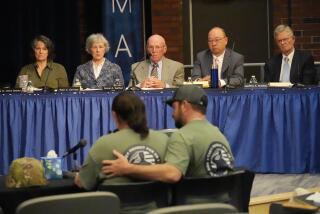Failure on a Number of Fronts
These are excerpts from comments by Thomas H. Kean, chairman of the National Commission on Terrorist Attacks Upon the United States, and Lee H. Hamilton, vice chairman, as they released the panel’s report.
*
Chairman Kean
On Sept. 11, 2001, 19 men armed with knives, box cutters, Mace and pepper spray penetrated the defenses of the most powerful nation in the world. They inflicted unbearable trauma on our people, and at the same time they turned the international order upside down.
At this point, we would like to ask you to remember for a moment how you felt that day: the grief, the enormous sense of loss. But remember also how we came together that day as a nation, young and old, rich and poor -- didn’t matter whether you were a Republican or a Democrat. We had a deep sense of hurt, but out of that came a deep sense of purpose. We knew what we had to do as a nation to respond, and we did.
But it’s also fair to say that on that September day, we were unprepared. We did not grasp the magnitude of a threat that had been gathering over a considerable period of time. As we detail in our report, this was a failure of policy, management, capability and, above all, a failure of imagination.
Now, we recognize as commissioners that we have the benefit of hindsight. And since the plotters were flexible and resourceful, we cannot know whether any single step or series of steps would have defeated them. What we can say with a good deal of confidence is that none of the measures adopted by the United States government before 9/11 disturbed or even delayed the progress of the Al Qaeda plot.
... Our failures took place over many years and administrations. There’s no single individual who is responsible for our failures. Yet individuals and institutions cannot be absolved of responsibility. Any person in a senior position within our government during this time bears some element of responsibility for our government’s actions.
Having said that, it is not our purpose to assign blame. As we said at the outset, we look back so that we can look forward. Our goal is to prevent future attacks.
Vice Chairman Hamilton
This commission, of course, does not have all of the answers, but we have thought about what to do, a global strategy, and how to do it, a different way of organizing our government. Based on our thorough review of the government’s performance and our examination of the enemy, we recommend the following elements for a counterterrorism strategy.
The strategy must be balanced. It must integrate all the elements of national power -- diplomacy, intelligence, covert action, law enforcement, economic policy, foreign aid, homeland defense and military strength. There is no silver bullet or decisive blow that can defeat Islamic terrorism. It will take unity of effort and sustained and effective use of every tool at our disposal. We need to play offense, to kill or to capture the terrorists, deny them sanctuaries and disrupt their ability to move money and people around the globe.
We need to ensure that the key countries, like Afghanistan and Pakistan and Saudi Arabia, are stable, capable and resolute in opposing terrorism. We need to sustain a coalition of nations that cooperates bilaterally and multilaterally with us in the counterterrorism mission.
... If, God forbid, there is another attack, we must be ready to respond. We must educate the public, train and equip our first responders and anticipate countless scenarios.
... We recommend a national intelligence director. We need unity of effort in the intelligence community. We need a much stronger head of the intelligence community and an intelligence community that organizes itself to do joint work in national mission centers.
... We endorse many of the actions taken in the wake of 9/11 to facilitate government action and information sharing. But we stress that these measures need to be accompanied by a commitment to our open society and the principle of review, safeguards that are built into the process and accompanied by vigorous oversight. We must, after all is said and done, preserve the liberties that we are fighting for.
More to Read
Sign up for Essential California
The most important California stories and recommendations in your inbox every morning.
You may occasionally receive promotional content from the Los Angeles Times.










